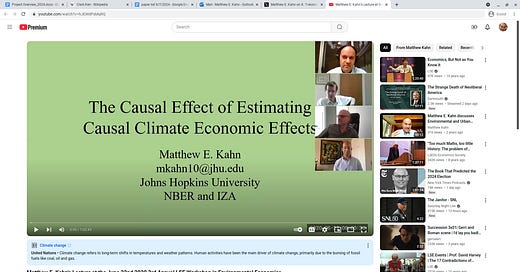Back in 2020, I gave a Zoom LSE lecture that you can listen to here.
In this column, I want to offer some new thoughts and revisit my old points.
#1 What is a Causal Climate Economics Effect study?
Here is a famous one.
Burke, Marshall B., Edward Miguel, Shanker Satyanath, John A. Dykema, and David B. Lobell. "Warming increases the risk of civil war in Africa." Proceedings of the national Academy of sciences 106, no. 49 (2009): 20670-20674.
The authors collect annual data for nations in Sub-Saharan Africa for several decades. They code up a dummy variable that equals one if the nation is fighting a Civil War and that equals zero if there is peace. They collect data on a bunch of national attributes but they focus on whether the nation was experiencing a hot summer.
They use a standard linear regression and try to use this observational research design to test a causal hypothesis. Hypothesis: Extreme heat raises the probability of Civil War. They report statistically significant evidence of such a gradient.
#2 In this case and many others, the researchers are using reduced form data analysis to uncover a past statistical relationship. This “Freakonomics” is useful for informing our understanding of the pathways through which extreme weather affects our lives. Here is another example:
Park, R. Jisung, Joshua Goodman, Michael Hurwitz, and Jonathan Smith. "Heat and learning." American Economic Journal: Economic Policy 12, no. 2 (2020): 306-39.
and here is another;
Barreca, Alan, and Jessamyn Schaller. "The impact of high ambient temperatures on delivery timing and gestational lengths." Nature Climate Change 10, no. 1 (2020): 77-82.
#3 In addition to contributing to our understanding of the mysteries of life, this work seeks to nudge policy makers to take proactive steps to lower global greenhouse gas emissions. Why? The argument states that if we do reduce our global GHG emissions, then all of these climate change effects documented by the researchers will not play out.
____________________________________________________________________________
My starting point in my own research focuses on the microeconomics of climate change. We are not passive victims in the face of rising GHG emissions. If we are aware of the risks that the we face (because these cause and effect researchers have played the role of Paul Revere), then we have strong incentives to seek out private solutions to help us to adapt to these threats.
Rural people in Africa who face resource scarcity caused by heat and drought can urbanize and this reduces Civil War Risk.
Urban students in a hot Baltimore classroom in May can continue to learn if their schools install air conditioning or if they attended a private school that had air conditioning. Under a Milton Friedman school choice proposal, this 2nd possibility would play out in our inner-cities.
Those who seek to have a child and understand how high temperatures can affect fertility odds can change their behavior to achieve their fertility goals.
In each of these case, the private sector steps up out of a profit incentive to offer solutions to the challenges we recognize that we face.
My adaptation optimism is based on the private sector’s incentive to design products that we demand and our growing recognition that we do face challenges posed by wild weather risks. The empirical data scientists help to expand our imagination with their findings.
This group of scholars does over-reach as they engage in naive extrapolation about our future based on past correlations. This violates the Lucas Critique and it conveys a false sense of over-confidence about our ability to predict the future. The naive environmental journalists love this “doom and gloom” stuff and read it and report it and then my mother calls me up and tells me that we are doomed.
As the causal inference data scientists take over modern economics, we are missing out on “feedback loop” research that thinks through how a market economy that features buyers and sellers responds as new opportunities arise. The Climate Social Data Scientists document “crisis” but don’t think through hard enough how one person’s crisis is another person’s opportunity if the latter can design products to solve the former’s problem. This is how a market economy operates! This is free market adaptation at play.





Why (strategically) avoid studies like Burke et al. 2024 that look at long time periods? Shouldn't adaptation have kicked in? Even still, you need to pay for it—and adaptation takes time. In your book, you evoke Hiroshima and Nagasaki, which recovered in a matter of decades—impressive, sure, but people have to live through those decades. The city's eye view looks great; the human's eye view of a nuclear strike—even if you live to tell about it—doesn't. Your big points, over and over, are that the worst effects of climate change are solved by paying for things—adaptation—and by migration. What about the last week (or years) has made you think that the masses look fondly on migration and inflation? I am sympathetic to the case that any reasonably person should take the wealth of year 2100 with the climate of 2100, because wealth will more than compensate for the damage of climate change, but a) I am not sure that is how most people think about things, which is going to make adaptation more difficult (see: impossible), and b) wouldn't it be nice to have the wealth without X% climate tax on it? The crass "Lucas Critique—eat it!" response ignores the social and political realities. For example, isn't the fact that Europeans keep dying instead of buying air conditioning an affront to the Lucas Critique? Instead, you bizarrely take it as an excuse to invoke the critique—but it proves the opposite, people are slow to adapt, and they die! Human's eye view...